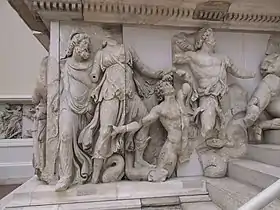Nereus
In Greek mythology, Nereus (/ˈnɪəriːəs, ˈnɪərjuːs/; Ancient Greek: Νηρεύς) was the eldest son of Gaia (the Earth) and of her son, Pontus (the Sea). Nereus and Doris became the parents of 50 daughters (the Nereids) and a son (Nerites), with whom Nereus lived in the Aegean Sea.[1]

| Greek deities series |
|---|
| Aquatic deities |
Etymology
R. S. P. Beekes suggests a Pre-Greek origin.[2]
Mythology
In the Iliad[3] the Old Man of the Sea is the father of Nereids, though Nereus is not directly named. He was never more manifestly the Old Man of the Sea than when he was described, like Proteus, as a shapeshifter with the power of prophecy, who would aid heroes such as Heracles[4] who managed to catch him even as he changed shapes. Nereus and Proteus (the "first") seem to be two manifestations of the god of the sea who was supplanted by Poseidon when Zeus overthrew Cronus.
The earliest poet to link Nereus with the labours of Heracles was Pherekydes, according to a scholion on Apollonius of Rhodes.[5]
During the course of the 5th century BC, Nereus was gradually replaced by Triton, who does not appear in Homer, in the imagery of the struggle between Heracles and the sea-god who had to be restrained in order to deliver his information that was employed by the vase-painters, independent of any literary testimony.[6]
In a late appearance, according to a fragmentary papyrus, Alexander the Great paused at the Syrian seashore before the climacteric battle of Issus (333 BC), and resorted to prayers, "calling on Thetis, Nereus and the Nereids, nymphs of the sea, and invoking Poseidon the sea-god, for whom he ordered a four-horse chariot to be cast into the waves."[7]
Nereus was known for his truthfulness and virtue:
But Pontos, the great sea, was father of truthful Nereus who tells no lies, eldest of his sons. They call him the Old Gentleman because he is trustworthy, and gentle, and never forgetful of what is right, but the thoughts of his mind are mild and righteous.[8]
The Attic vase-painters showed the draped torso of Nereus issuing from a long coiling scaly fishlike tail.[9] Bearded Nereus generally wields a staff of authority. He was also shown in scenes depicting the flight of the Nereides as Peleus wrestled their sister Thetis.
In Aelian's natural history, written in the early third century CE,[10] Nereus was also the father of a watery consort of Aphrodite named Nerites who was transformed into "a shellfish with a spiral shell, small in size but of surpassing beauty."
Nereus was father to Thetis, one of the Nereids, who in turn was mother to the great Greek hero Achilles, and Amphitrite, who married Poseidon.
Notes
- Hesiod, Theogony 233-36, is unequivocal that Nereus is the Old Man of the Sea (ἅλιος γέρων), whereas the Odyssey gives the sobriquet to Nereus (xxiv.58) to Proteus (iv.365, 387), and to Phorkys (xiii.96, 345).
- R. S. P. Beekes, Etymological Dictionary of Greek, Brill, 2009, p. 1017.
- Iliad i.358, 538, 556; xviii.141; xx.107; xxiv.562.
- Or, as Proteus, Menelaus.
- On Argonautica iv.1396f, noted by Ruth Glynn, "Herakles, Nereus and Triton: A Study of Iconography in Sixth Century Athens" American Journal of Archaeology 85.2 (April 1981, pp. 121–132) p 121f.
- Glynn 1981:121–132.
- Karl Wilhelm Ludwig Müller's ed. Papyrus Oxyrrhincus Fragmenta Historicorum Graecorum 148, 44, col. 2; quoted by Robin Lane Fox, Alexander the Great (1973) 1986:168 and note. Thetis was the mother of Alexander's hero Achilles.
- Hesiod, Theogony 233
- Theoi.com; Glynn 1981.
- Aelian, On Animals 14.28
References
- Kerenyi, Karl (1951). The Gods of the Greeks.
- Graves, Robert (1955). The Greek Myths.
External links
| Wikimedia Commons has media related to Nereus. |
- Chisholm, Hugh, ed. (1911). . Encyclopædia Britannica (11th ed.). Cambridge University Press.
- Theoi Project, Nereus—the sea-god in classical literature and art